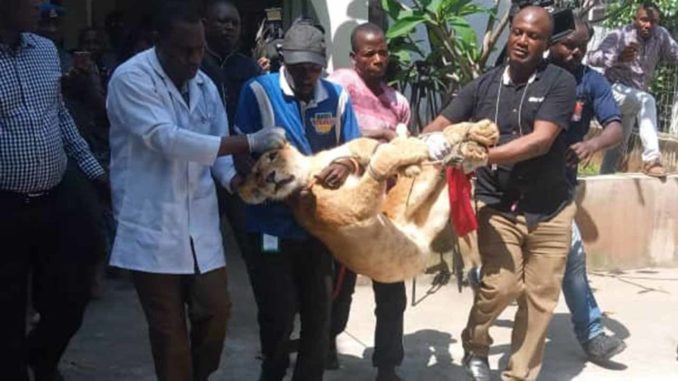
A recent report that a lion discreetly kept in a private residence was seized by state officials in Lagos, shows the level of impunity that has pervaded the Nigerian society, which the political elite have entrenched. And anyone who could afford it at that level rides rough shod with the law without qualms. This is quite unfortunate.
That an Indian could be so unperturbed, knowing full well that his action is illegal, to harbour a lion in his private residential apartment, thereby exposing members of the public to danger speaks volumes on the extent to which law and order have degenerated in this society. Not even foreigners have respect for law and order anymore.
It is unthinkable that a Nigerian could attempt to keep a lion in his apartment in India. The fear of the law would scare him. But here we are; the Indian felt no restriction, whatsoever, which emboldened him to harbour such a wild beast in the midst of human beings. The action is tantamount to a slap on our law enforcement.
It is pertinent to ask how the Indian brought in the lion. If, as reports indicate, that he brought it from Cameroon, how did he manage to bring it in? Where were the customs, the Nigerian Quarantine Service, the police and other law enforcement agencies when he brought it in?
Was it brought in by air, land or sea? Were the law enforcement officers compromised? All of these agencies are culpable for not intercepting the animal in transit. Doubtless, investigation should be carried out to unravel the mystery behind the lion and its owner.
Report about the presence of the lion jolted members of the public. The prompt response of the authorities of Lagos State Government, following a petition, led to tranquilising and evacuation of the lion to Omu Resorts Zoo in Lekki after 72 hours of close observation by the police.
According to reports, officials of the Lagos State Environmental Sanitation and Special Offences (Enforcement), together with officials of the Lagos State Ministry of Agriculture and medical personnel from the Faculty of Veterinary Medicine, University of Ibadan, performed the evacuation.
CSP Olayinka Egbeyemi, who led his men in the operation, said in a statement, that Dr. Ogunmo Bamidele, leader of the medical team tranquilised the lion thrice before evacuation.
However, a disclosure by Egbeyemi that the Indian owner of the lion was yet to be found is curious. Rather than be present during the evacuation, he instead sent three Nigerians who claimed to be his workers. It is hoped that the disappearing act of the owner of the lion was not a cover-up by compromised state officials.
The police promised to work with the men to find him. The police should endeavour to apprehend him to answer questions about the animal. This is to warn other individuals who may be nursing the idea of bringing in such wild animals without following procedure and guidelines.
Besides, the incident is an eye opener and indeed, a wakeup call to members of the public to be vigilant everywhere they may be to expose others keeping such dangerous animals in their homes. It is not out of place that some individuals keep snakes, pythons, crocodiles and other wild creatures they fancy in their home, which poses danger to the public in the event of an escape.
Surprisingly, a lion that roars could be kept for two years without being detected by anyone. It shows the insensitivity of members of the public, particularly, those living around No. 229 Muri-Okunola Street, Victoria Island, where the lion was kept. We have responsibility for our safety. Everyone has the duty to look out for danger lurking around our neighbourhoods.
Meanwhile, a point needs to be made about the Indian keeping such a wild animal in a populated city centre. The attitude of the average Nigerian to (fair skinned) foreigners needs to be reexamined. Lingering colonial mentality may have prevented state officials from probing the compound of the lion’s owner.
It is not clear why the laws covering the private possession of big cats, which applies to members of Convention of International Trade on Endangered Fauna and Flora (CITES) are not effective in Nigeria and so not observed. Nigeria is a signatory to CITES.
But the law certainly applies in India and the Indian national is aware of it. In India, “the private possession of endangered cats, including cheetahs, clouded leopards, fishing cats, golden cats, Indian lions, leopards, panthers, marbled cats, snow leopards and tigers, is prohibited unless the person has a certificate of ownership for a wild animal he or she possessed at the commencement of the wildlife protection law, which was enacted in 1972.”
Unfortunately, our laws are weak. Lions are not supposed to be kept at home because they cannot be caged or tamed. The lion can never be a domestic animal. It can escape and put lives in danger. Certainly, lion is not an animal for the house. There are clear procedures for keeping such wild animals and only experts trained to handle them are allowed to do so.
The lion stands impounded by the Lagos State. The unknown Indian should be investigated and charged to court. In the same vein, the source of the lion’s entry into the country should be probed to find out if our immigration and customs officials are accessories after the fact of the mystery surrounding the presence of a lion in a private home in Lagos. The discovery of a lion in a private residence of an Indian in the economic capital of the country, Lagos, should be a starting point for further investigations into such illegal practices that can endanger life and property in the society.
END

Be the first to comment